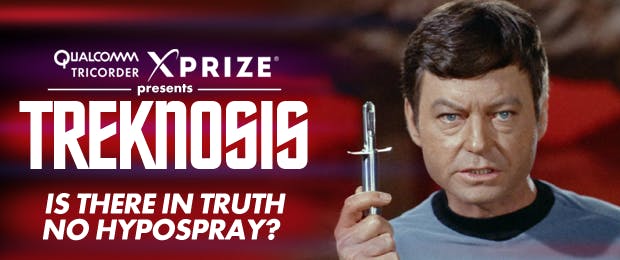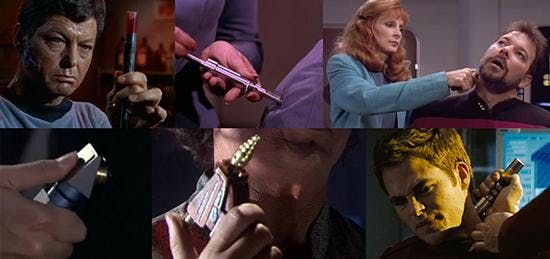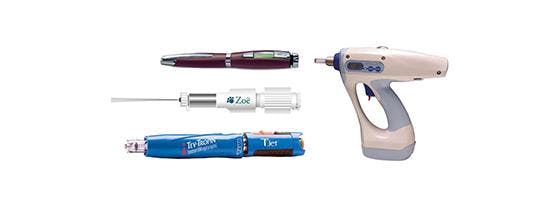Published Aug 25, 2014
TREKNOSIS: Is There In Truth, No Hypospray?
TREKNOSIS: Is There In Truth, No Hypospray?

Of course hyposprays exist, you silly sehlat! "You might feel a little pinch." Nurses have been saying that, or something like it, to everyone who’s ever received a shot for generations; it puts the pain and fear of injections into some kind of perspective, which we're all for. Because really, nobody likes needles. And no one believes they won’t hurt. So why are we still using 'em? As any Starfleet doctor worth his or her salt would say, "Where's my hypospray?" The answer? Closer than you think.
Some of you might be asking "What is a hypospray, now that you mention it?" Glad you asked. The hypospray is what everyone wishes a syringe could be: a device that literally sprays liquid medications through your skin by shooting them at very high pressure through a very small hole. Imagine taking a cup of water and tossing it at a sheet of burlap: none of that water's getting through. But if you take the same amount and load it into a water pistol, then put the muzzle right up against the cloth and pull the trigger, some of it will squirt through to the other side. That's basically what a hypospray does, but better, and on a smaller scale. Interestingly, the one Bones uses in Star Trek: The Original Series looks a lot like a conventional syringe, while the one employed throughout the 24th century was reportedly based on an inhaler, another trusty device that delivers medicine in handy spray form.

Hyposprays are Starfleet Medical's delivery device of choice for any number of reasons, but here are three:
? No more needles. Hyposprays are less invasive, gentler and less painful. Even in the 24th century, there are still people who hate going to the doctor (see: every starship captain... ever), and doing away with terrible needles only helps.? A syringe shoots all of its cargo into one spot in the human body. A hypospray is designed to, well, spray its medication into a diffuse area under the skin, which lowers the amount you need.? Hyposprays work through clothing — no need to get anyone to roll up a sleeve or even find a vein.
If all that sounds good to you, there's even better news: hyposprays are almost a real thing. The technology we have now, first patented in 1960, is most commonly referred to as a "jet injector." It's nearly as cool-sounding a name as "hypospray," although a few scientific journals did actually call jet injectors hyposprays around the end of the 60s. This was probably not a coincidence.

The jet injector was originally intended for mass vaccinations in places where supply of needles was an issue, but it was eventually ditched for a number of unfortunate reasons:
? Present-day jet injectors need to be right up against the skin in order to work, and when they fire, they break the skin just a bit. There's a risk of transmitting diseases from person to person if you jet-inject a lot of people in a row. This is an especially big deal if you're trying to vaccinate them against disease in the first place.? Jet injectors have a lot of moving parts that make them annoying to maintain in decent working order, not to mention the fact that they are costly.? There've been some reports that jet injectors can be just as painful as needles. In the 2009 Star Trek, James Kirk definitely seemed to find Dr. McCoy's hyposprays annoying at the very least!

As nasty as they are, needles are at least straightforward in concept. Where'd we get this weird idea for jet injectors anyway? Strangely, we may have industrial accidents to thank for that one. Under just the right combinations of unfortunate circumstances, a few unlucky people have been accidentally injected with needle-thin, high-pressure streams of lubricants and other unpleasant fluids — even right through their protective clothing (word to the wise: do not Google this unless you're prepared to look at things that would make even the most stalwart Klingon warrior flinch). Fortunately, someone eventually figured out that this awful happenstance might have direct medical applications, and the jet injector was born.
Hyposprays are almost here. We just need to make them less complex, cheaper to build and fix the cross-contamination problem. PATH is working on that last one even as we speak, and the other two challenges will no doubt be met by the time we've invented warp drive. They'd better be, or else we'll have to get our Melvaran Mud Flea vaccinations the old-fashioned way, and that won't be any fun at all. As Kirk said to McCoy in the 2009 film, “Stop that!”
--
Jon Sung is a contributing writer for XPRIZE and copywriting gun-for-hire to startups and ventures all over the San Francisco Bay area. When not wrangling words for business or pleasure, he serves as the first officer of the USS Loma Prieta, the hardest-partying Star Trek fan club in San Francisco.
XPRIZE is an innovation engine. We design and operate prize competitions to address global crises and market failures, and incentivize teams around the world to solve them. Currently, we are operating numerous prizes, including the $30M Google Lunar XPRIZE, challenging privately funded teams to successfully land a robot on the Moon’s surface, and the $10M Qualcomm Tricorder XPRIZE, challenging teams around the world to create a portable, wireless, Star Trek-inspired medical device that allows you to monitor your health and medical conditions anywhere, anytime. The result? Radical innovation that will help us all live long and prosper. Sign up today to join our mission, be a part of our campaign and win collectibles at: tricorderfederation.org.




